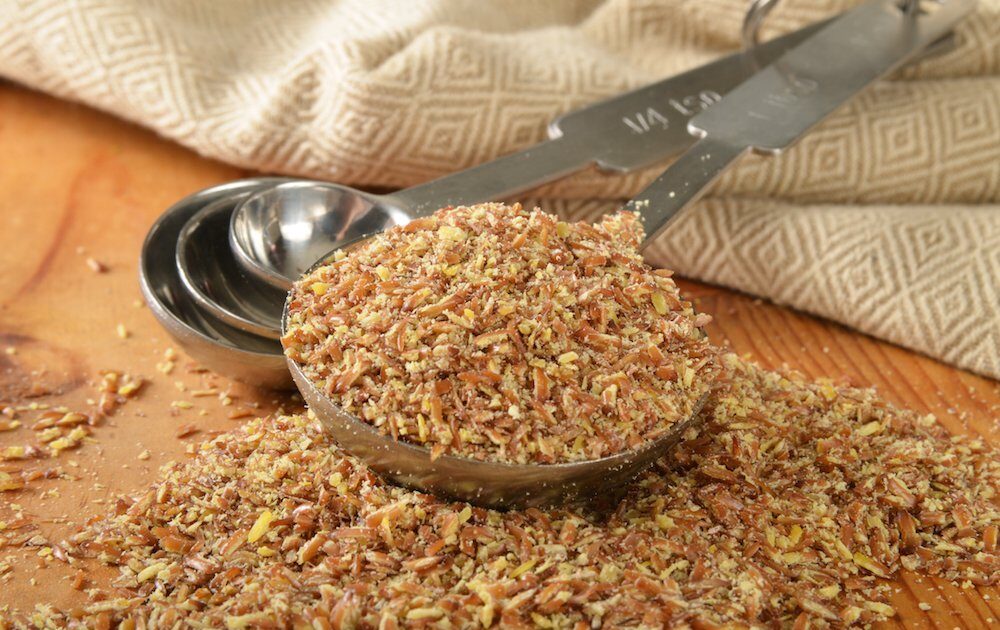The Remarkable Health Benefits of Flax Seeds: Don’t Miss Out on This Powerful Plant’s Nutrients

If you’re looking for a serious nutritional boost, incorporating more nuts and seeds into your diet is an easy and delicious way to do it. In particular, the health benefits of flax seeds, are extremely powerful–packing a big nutritional punch in each tiny seed.
Nutrition of Flax Seed and Its Health Benefits
Rich in alpha-linolenlic acid (ALA), the omega-3 fatty acid that flax seeds contain is the runner-up to the sources of omega-3s found in cold water fish (EPA and DHA). These helpful omega-3s are known to fight inflammation and may even help reduce the risk of certain diseases including heart disease, diabetes, arthritis, asthma, and even cancer.
While it can’t exactly replace the omega-3s you get from fish, studies have found that the ingestion of ALA has had a positive impact on cardiovascular disease. It’s also been shown to lower high cholesterol in men, providing a natural and drug-free way to reduce the development of plaque in the arteries.
The positive effect on cholesterol is associated with flax seed being high in phytochemicals called lignans. Lignans contain a high amount of antioxidants, which may also help boost immunity. According to the Mayo Clinic, the lignans found in flax seeds may be helpful in regulating female hormones due to the role they play in balancing out estrogen.
One study found the flax seed use was associated with reduced hot flash in postmenopausal women. A group of women who consumed flax seed daily for six weeks saw a reduction of mean hot flash scores by 4.9 units compared to a reduction of 3.5 units in a group of women to took a placebo.
For a natural boost in healthy vitamins and minerals, flax seeds have a lot to offer. They’re packed with vitamin B1 and B2, vitamin C, vitamin E and carotene. Zinc, iron, magnesium, and manganese are also contained in this powerful little seed.
Flax Seeds for Weight Loss and Digestive Health
One tablespoon of ground flax seeds have about 37 calories, containing almost 3 grams of fat, 2 grams of carbohydrates, a little over 1 gram of protein, and around 2 grams of fiber. Since flax seeds are low in carbohydrates, it’s a great choice for people who are watching their weight. The seeds’ healthy fat content and generous dose of fiber will also keep you feeling full for longer, so you’ll feel less of a desire to splurge and break your diet.
Because of its high fiber content, flax seeds have natural laxative properties. If you have a sensitive digestive system, it would be wise to start incorporating flax seed into your diet in very small amounts and ensure you’re drinking enough water throughout the day as well. If you suffer from irritable bowel syndrome or have any other digestive concerns, talk to your doctor about first before adding it to your diet.
Beauty Benefits of Flax Seeds
Flax seeds’ healthy helping of ALA combined with the B vitamins make it an ideal choice for naturally improving the look of skin, hair, and nails. The essential fats and vitamins help maintain cell membranes while reducing dryness, minimizing flakes, and even combatting skin conditions like acne and rosacea.
For a quick and simple flax seed facial that puts its anti-inflammatory properties to work, you can mix 3 to 4 tablespoons of ground flax seed with one-quarter cup of Greek yogurt, one teaspoon of raw honey, and one teaspoon of ground cinnamon.
Without trying to eat too much of the mixture (since it would make a perfectly yummy yogurt snack too), spread it over your face and leave it on for 10 to 15 minutes before washing it off. The probiotics from the Greek yogurt will also help control acne while you’ll get the added blood stimulation from the cinnamon and anti-bacterial properties from the honey.
How to Use Flax Seeds in Your Diet

Some grocery stores carry whole flax seeds, but if you can’t find them there, your local health food store should almost definitely have them. Bear in mind that you should look for ground flax seed as opposed to whole, since consuming them in their ground up form is easier to digest and maximizes nutrient absorption.
“Flax is a wonderful source of fiber, but it is important to freshly grind the seeds before consuming to ensure proper digestibility and maximum nutrition,” says Tara Miller, a holistic nutritionist.
If you can’t find ground flax seeds but can get your hands on whole ones, then you can still purchase them and grind them up at home using a coffee grinder. Consider storing your ground flax seeds in the freezer to keep them lasting longer and to prevent oxidization.
“Add 1 to 2 tablespoons to your cereal/oatmeal/porridge, yogurt, smoothies, in homemade cookies and muffins,” recommends Miller. She also points out that you can combine one tablespoon of ground flax seed with 2 1/2 to 3 tablespoons of water to use as a vegan substitute for an egg. Simply add the ground flax and water, stir until mixed, and the leave to rest for about five minutes to let it thicken up a bit. You can use it in place of an egg to make pancakes, brownies, muffins, cookies, and other baked goods.
Flax seeds generally have a nutty flavor to them, which is subtle enough to use in all sorts of recipes without overpowering other flavors, making flax seeds an excellent, healthy food choice.
Related on Organic Authority
Omega-3 Fatty Acids: Flax vs. Fish
3 Ways to Bake Flax Seeds into Your Holiday Treats
The 7 Most Ultimate Seeds: Superfoods Made Easy
Image of ground flax seed via Shutterstock
Image of flax seed and oatmeal smoothie via Shutterstock

